

Cancer researchers in the decades ahead will face a new landscape of challenges and opportunities. For this reason, NCI continually adapts its training programs to accommodate rapid developments in the frontiers of science and technology.
Cancer is not just a U.S. domestic issue. Each year more than 11 million people are diagnosed with cancer and more than 6 million die world-wide. That toll is greater than deaths from AIDS, tuberculosis, and malaria combined. NCI's international efforts are designed to foster research and build research capacity globally. NCI funds foreign contracts and grants, develops partnerships with other nations and organizations, and provides training opportunities for American scientists abroad and foreign scientists in the United States. NCI remains committed to supporting and expanding its international research efforts.
Global Cancer Incidence and Mortality

Highlights of NCI's international efforts include:
Partnerships. The Middle East Cancer Consortium (MECC) includes Cyprus, Egypt, Israel, Jordan, the Palestinian Authority, and Turkey. Over the past decade, MECC has supported population-based cancer registries. NCI also acts as a sustaining partner of the Breast Health Global Initiative, which strives to develop, implement, and study guidelines to improve interventions for breast cancer in countries with limited resources.

Air pollution, a major contribution to
cancer risk, in Shanghai, China
Research. A global approach to research enables explorations of interactions between genes and specific environmental exposures found in diverse geographical settings. With the Chinese Center for Disease Control, NCI researchers have evaluated cancer risk associated with occupational exposure to benzene. The results of these studies were considered by the U.S. Environmental Protection Agency (EPA) in establishing a rule to limit the benzene content in gasoline, significantly reducing emissions of hazardous air pollutants in the United States. NCI-funded U.S. and Turkish researchers have studied malignant mesothelioma (MM), which accounts for 50 percent of all deaths in certain Turkish villages and has been linked with use of erionite, a carcinogenic mineral fiber. The researchers found that only some families suffer from a high incidence of the disease, because they possess a genetic predisposition that influences the development of MM. In addition to contributing to prevention and treatment for MM in Turkey, these studies also may improve prevention and treatment in the United States, where about 2,000 new cases of MM, primarily attributable to asbestos exposure, are diagnosed each year.